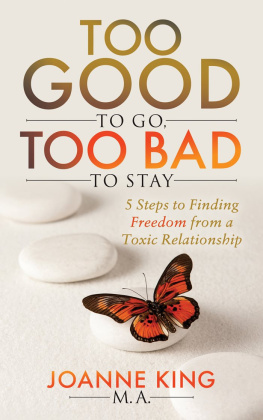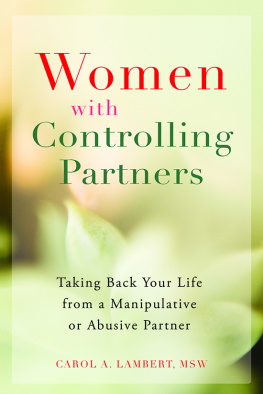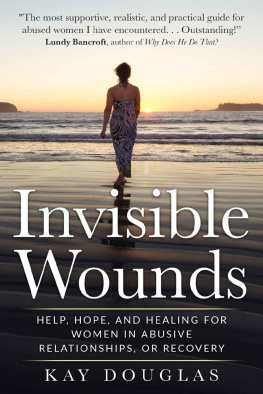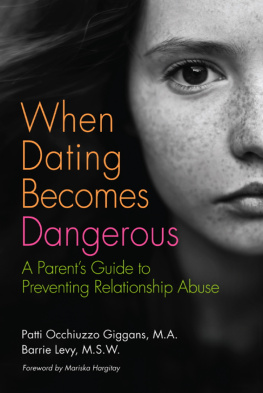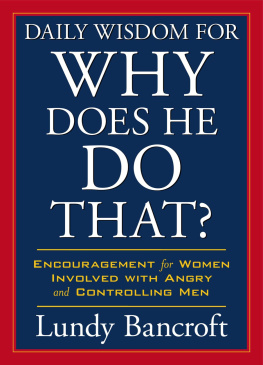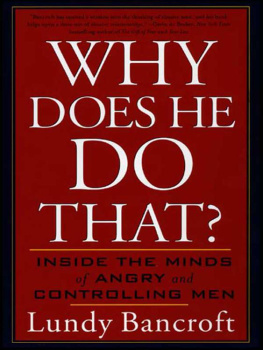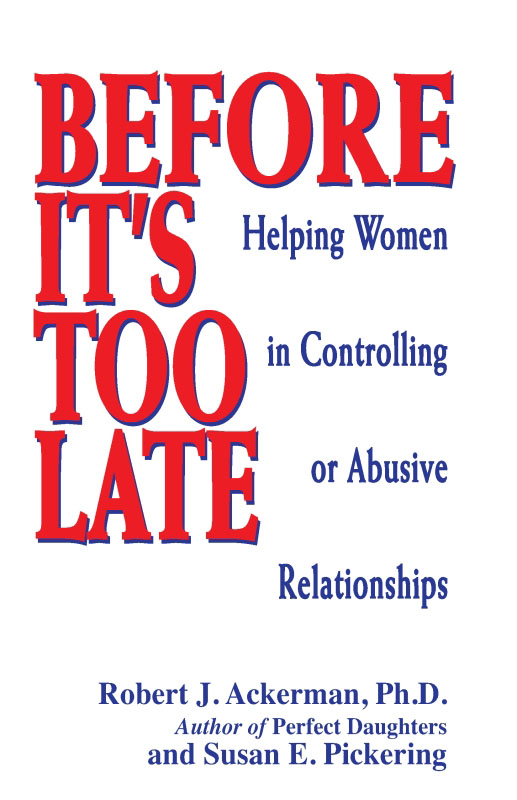
Table of Contents
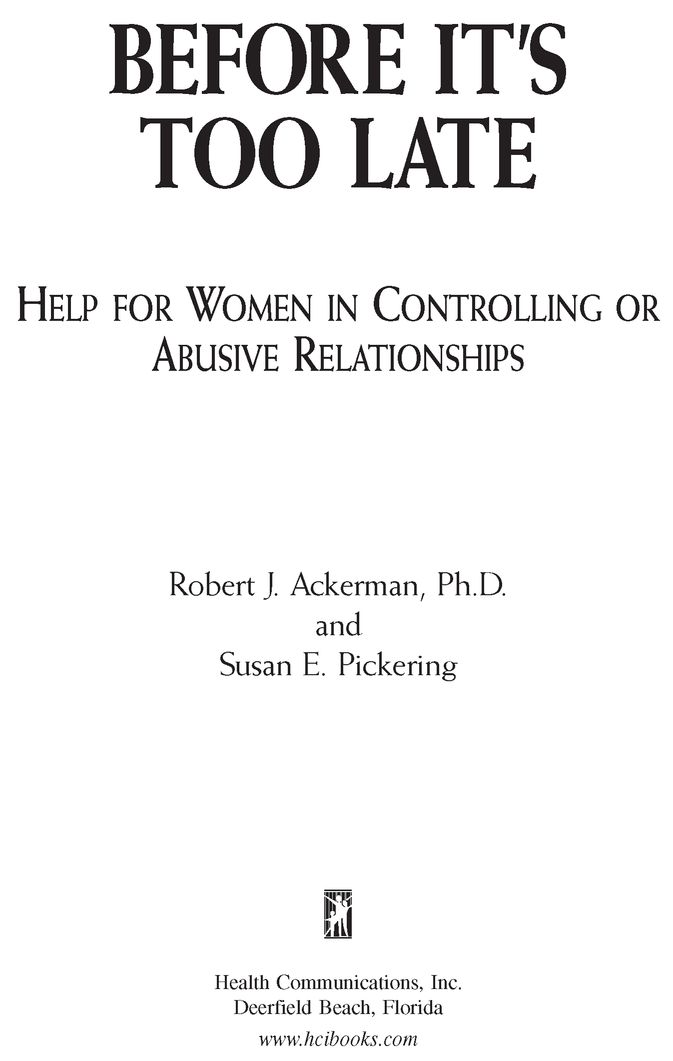
... to the women who were willing to share part of their lives,
to help other women get through part of theirs
PREFACE
One sees that dead, vacant look steal over the rarest, finest of womens faces... in the very midst, it may be, of their warmest summers day; and then one can guess at the secret of intolerable solitude that lies hidden beneath the delicate laces and the brilliant smile.
Rebecca Harding Davis
Knowing when to detach yourself from an unhealthy situation can be a healthy response. However, waiting too long can be dangerous. Too many women have paid the price for delaying. Newspapers are full of reports about crimes against women by an abusive partner. Certainly help is available, but it is not that simple. Getting out of any relationship is difficult. Getting out of an overly controlling one may seem impossible. However, many women are beginning to realize that alternatives are available, that change can happen in their livesin or out of their relationshipsand that living in fear is not living.
Abusive or controlling relationships produce fear. The more the fear grows, the harder it is to make rational choices. Once a relationship has passed the point of working things out, it usually deteriorates rapidly. Partners no longer trust each other, tempers run out of control, self-defeating behaviors increase and both partners begin to question their sanity and reasons for getting into the relationship in the first place. This is especially true for those living with very controlling partners, such as in the case of various types of abuse.
Living with someone who abuses you, abuses others or abuses substances is no spectator event. You cannot help but be involved. If you or someone you love is experiencing physical, sexual, emotional or spiritual abuse in a relationship, then this book is for you.
Not all abused women react alike. We know that many abused women try desperately to find a way to stop it; they confide in family or friends, turn to agencies for help, yet still they feel trapped, without hope and without a healthy means of recovery. We know that if her search for help fails, if the problem persists and grows, a woman begins to feel completely helpless. Not knowing what to do about the abuse and not knowing what to do about your recovery can be over whelming. This is especially true for the many women in multiple or double jeopardy abusive situations. These are abused women who are involved with someone who also abuses alcohol, thus compounding the problem.
Unfortunately, abusing alcohol and abusing women are often correlated. The exact nature of the relationship between the two is seldom understood. Does one cause the other? Do both behaviors stem from something else? Regardless of the answer, we know two things. First, far too often the two forms of abuse occur together. Second, many women are in agonizing pain as a result.
In this book, we have sought to provide a unique look at the destructive interrelationship between alcohol abuse and spouse abuse. We disclose the type of information the abused victim must have not only about spouse abuse, but also about alcohol abuse. We recommend a combined recovery approach for the many victims of double jeopardy. Just as one is victimized by spouse abuse, so too is one a victim of its alcoholic component. Both of these victimizations require recovery to live a more emotionally satisfying life, free of denial, fear, depression, physical danger, low self esteem, guilt, anger and hopelessness.
Our approach blends our experiences in two different fields to achieve one goal, recovery for abused women. Susan has worked for more than 15 years with abused women, as a counselor and group leader in womens shelters. Robert has 20 years experience in the alcoholism field, especially alcoholism and the family. Throughout this book there are many real case histories demonstrating the need for this combined effort. We hope that abused women will find insight, alternatives, growth, safety, health and the motivation to recovery in these pages.
Susan Pickering
Robert Ackerman
ACKNOWLEDGMENTS
We wish to thank all of the women we have met and worked with for sharing themselves and their stories. Without their willingness to give to others, this book would not have been possible.
We owe much to Judy Michaels for her ideas and chapter by chapter reviews, our appreciation to Edward Gondolf for his willingness to share his expertise on family violence, thanks to Lee Joiner and Pat Holiday for their suggestions and help, and finally, a very special thank you to Martha McNeill and Judy Sturges.
To the staff of Health Communications, and especially to Christine Belleris, Kathryn Butterfield and Kim Weiss for their help, many thanks.
To our greatest supporters, our families, and especially our spouses, Kimberly and Jerry, thank you.
Susan Pickering
Robert Ackerman
I
ABUSIVE RELATIONSHIPS
Before a secret is told, one can often feel the weight of it in the atmosphere.
Susan Griffin
Cathy was raised in an abusive family. Today, she is married and has three children. Her husband is very controlling and jealous. Cathy is abused by her husband, who promises he will stop.
The very first time it happened, I knew in my head it would happen again, but in my heart I wanted to believe that he would never hurt me. I loved him! The first time was around Christmas. I had just quit my job. We went out with my mother, her boyfriend and his son Jack. Everything was fine at first. I saw a friend of ours (my husband didnt like him) and went over to talk to him. When I returned, my husband said he was leaving and left me there. I was very upset and confused. Why would he do that? Jack took me home. Stan was waiting for me when I got home.
We started to fight, I got my keys and went for the door but he grabbed me before I could get to the door. He ripped the keys out of my hand and crushed my fingers. He whipped the keys across the room, grabbed me by the neck and threw me against the Christmas tree. I fell to the floor and he started choking me and bouncing my head off the floor. I was gagging.
Then he suddenly let go of me and went into the kitchen. He was very quiet and hung his head down. I lay on the floor for a few minutes and I was scared. I had never seen him like this before; he was a madman.
At first I thought he was going to kill me. That is a terrible feeling to have. I was sitting on the couch, and was crying and shaking. He came in and sat down beside me. He went to touch me and I jumped back.
He started to cry and told me he loved me and didnt want to lose me. He said he was so sorry for what he had done to me. I felt so hurt. I also felt guilty and sorry for him. I knew he loved me and didnt mean to hurt me. I believed him when he promised he would never do it again. I wanted to believe him so much.
In July, I was on vacation from my job. I asked Stan to take a day off so we could spend some time together. He looked at me and laughed and said, For what? That was the day I stopped loving him. I went into the house and cried. I felt like I was worthless and not important enough for him to take a day off for. His job came before me; everything came before me. Things were never the same between us again.
Next page



